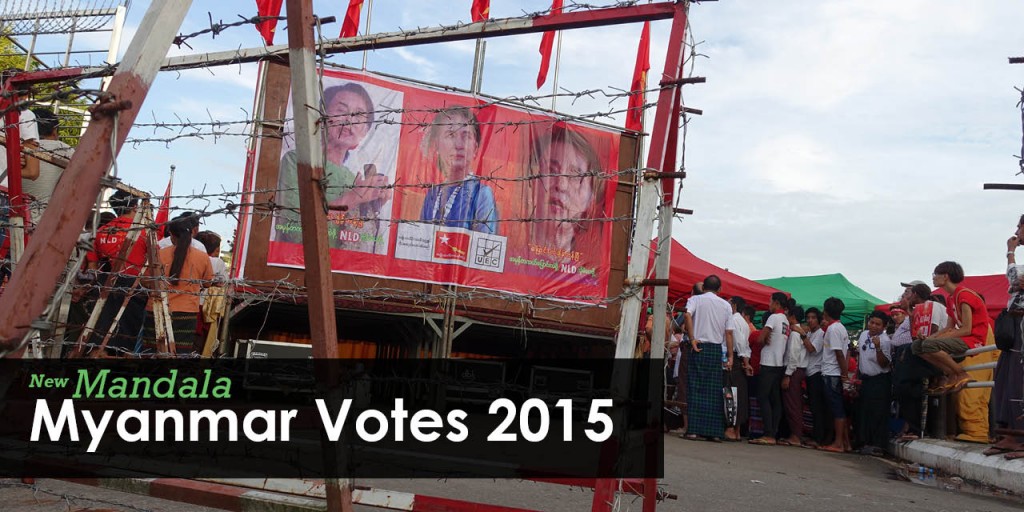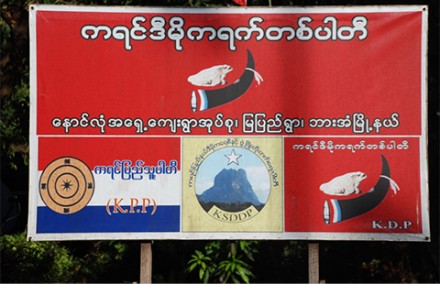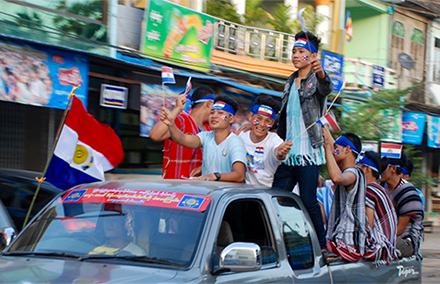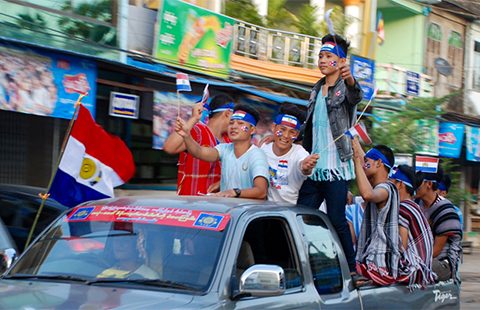
A proliferation of Karen parties and candidates highlights the challenge of political unity.
In a hot and gloomy schoolroom 40 kilometres southeast of Hpa’an, the Karen State capital, a candidate for the Phlone-Sqaw Democratic Party (PSDP) stands beside a huge replica ballot paper printed on tarpaulin. Ten parties and their logos face an audience of 40 farmers.
The candidate identifies the three Karen parties and explains the differences in colour and shape. He then covers two leaving the horns and drum of the PSDP. The farmers clap and shout.
With the world’s attention focused on electoral conflict between Myanmar’s ruling Union Solidarity and Development Party (USDP) and Daw Aung San Suu Kyi’s National League for Democracy (NLD), competition between the other 91 parties is easily overlooked.
Many of these are ethnic nationality parties which, in the final frantic days of campaigning, are locked in a bitter struggle to represent the interests and identity of their people.
For Karen communities this is just another chapter in a long struggle for political unity. With no less than six Karen parties and nearly three hundred Karen candidates contesting seats across the country, it would appear that Karen political differences have never been greater.
In an effort to take stock of the Karen political project on the eve of these elections I followed three of these parties as they campaigned in different parts of the country; what follows are snapshots from those encounters.
The Karen Peoples Party: for Karen and country
“For our Karens we need unity, that’s all – that’s the key issue.”
I am with Saw Say Wah, retired Police Colonel, Karen Affairs candidate for the Yangon Division Hluttaw and KPP General Secretary. We are driving out of Yangon to meet the Party faithful in Htantabin, a northern suburb.
“We have another strategy,” he explains. “We want to have a third power in our politics; there are only two in our country – the NLD and the USDP – we are trying to unite the ethnics and the other democratic forces.”
He describes how the KPP intends to use its membership of the Federal Democratic Alliance, a coalition of ethnic and Burmese political parties, to broker closer engagement with the Nationalities Brotherhood Federation, a large coalition of ethnic parties.
The KPP has been much maligned for its Executive’s background in government service and its non-Karen candidature, prompting other Karen parties to question its agenda and priorities.

A marriage of convenience: Karen parties in Karen State. Photo: Richard Dolan
At Htantabin a small group of Christian Sgaw Karen party members gather. Their Secretary now stands before them like a General in front of his troops, looking out of the window as he speaks.
A middle-aged man at the back consults the elections app mVoter on his smartphone, scrolling through the various candidates, hovering briefly over the Karen National Party (KNP) before flicking it away like some irritating fly.
Saw Say Wah’s lieutenant today is Saw Jacob Htoo, a 35-year-old lawyer and KPP candidate for the Amyotha Hluttaw in Yangon’s Hmawbi Township, and a great grandson of iconic Karen National Union President and Karen martyr Saw Ba U Gyi.
He is not the only KPP candidate from Karen aristocracy; others include granddaughters of Generals Smith Dun and Sanky.
The following day I join the KPP on the campaign trail in Ahlone where I meet Oo Tin Sein, the party’s Amyotha Hluttaw candidate for this Karen-dominated Yangon Township, and ethnic Barma. He tells me:
A lot of my friends are Karens, a lot of friends are Christian, a lot of my teachers are Christian, so that is why I am very close to them. It is thanks to those people who teach me so many things – that is why I want to help my people.
As we follow the campaign van in Saw Say Wah’s aging Nissan the KPP Secretary explains:
We Karens are not very tactful at all – we think the Burmans are our enemy – they are not our enemy, the political system is our enemy. We must avoid confrontation so we are trying to harmonise with every party, the government and all parts of society – this is our strategy to penetrate this government.
With the campaign song blasting overhead – ‘The KPP is coming with a United Force!’ – the Yangon traffic closes in around us like a vice.
The Karen National Party: a tale of two horses
In a clearing in Buffalo Swimming village on the Karen/Mon State border, Saw Aye Htoo, Chairman of the local Karen Literature and Culture Association (KLCA) and the KNP’s Karen Affairs candidate for the Mon State Hluttaw, holds aloft a copy of General Smith Dun’s autobiography, Memoirs of the Four-Foot Colonel.
The Buddhist Pwo Karen villagers sit in rows as in a schoolroom listening to him tell the story of how this diminutive Karen rose to become Commander-in-Chief of the Burmese Army. Afterwards he explains:
I try to educate them about our Karen because they don’t know that any Karen have achieved high office. I also tell them this so I can explain how they choose their leader for the next five years.
Women in traditional Karen dress from the nearby Agriculture and Farmer Federation of Myanmar are on hand to help the KNP candidate. As one of them hands me a campaign leaflet she whispers, “We are the real Karen – the pure Karen.”
It is a theme the candidate quickly picks up on:
A lot of Karen are hoping that the real Karen party will stand up so this is why we established our party. Our Karen people don’t like our Karen society to mix with some other Burmese, Chinese, Indians. The KPP are not bad, they are good but they are not real Karen because they are in bed with the government.
As we are preparing to leave U Shwe Myint of the National Development Party (NDP) arrives intent on speaking to the same village. He calls the locals to attention as if telling them that school is not yet over for the day. They reluctantly return to hear him speak. Saw Aye Htoo can’t resist schooling me:
In a horse race some horses will not win – they know that – but they have to make sure their horse will win so they try to disturb the other horses. The government has created a lot of sub-parties and then some of them will get the vote so NLD will not get it.
Back on the road he introduces me to a middle-aged woman who now sits exhausted beside me. “She is my campaign manager,” he explains, “but a USDP member – a strong USDP member!”
Everyone laughs.
“Don’t worry,” he says, “some of my party organisers are not KNP, some are USDP, a lot are NLD, but we are all Karen. In the village they concentrate on the Karen and forget about their party.”
The Phlone-Sqaw Democratic Party: a moral mandate
The PSDP are riding high. In 2010 they captured at least 70 per cent of the vote in Karen State, winning more seats across State and Union assemblies than any other Karen party.
They are fielding 44 candidates in this election, more than double the number that stood in the last election, and are confident they are going to win big.
We sweep out of town in an air-conditioned motorcade behind tinted windows. I am travelling with Saw Aung Kyaw Naing, a former government employee in the Ministry of Agriculture and Irrigation and PSDP incumbent candidate for the Amyotha Hluttaw in Karen State’s ‘Region 1’.
I ask him what distinguishes his party from the other Karen parties:
We are the real national party, we organise with the local people – the Karen people in Karen State, the national people – the real Karen people.

Photo: Richard Dolan
Despite its inclusive mantra, the PSDP is largely a Buddhist Pwo Karen party reflecting the identity and interests of the majority in Karen State. Only a minority of candidates are not Pwo-speaking Buddhists. Indeed, the party was largely founded by Ashin Pin Nya Tha Mi, Sayadaw of nearby Taungalae Monastery, who remains a significant power broker in party politics and the formation of policy.
As the candidate describes:
We don’t want conflict or illegality – we just want peace to organise our people, to manage our affairs self-sufficiently. We don’t want to favour certain groups and we don’t want to follow others.
When we turn our attention to the current state of Karen politics he holds little hope of coming to some sort of agreement with other Karen parties:
Some are organising with foreign people like the Burmese. Now that there are six Karen parties it is much more difficult to have discussions.
At the village of Wei Kayin I join some villagers crouching in the grass behind the schoolroom where the PSDP have set up. With the reverberation of the microphone echoing in the background they give me their views on Karen unity.
“We are Karen,” says one “we have two religions, Buddhism and Christianity, but we are the same Karen; we don’t need more parties.”
Later, one of the village elders takes me aside. “If our Karen people go down a road they go alone and never look back,” he says.
“But if we look back we will learn from the past and how we can move forward together in unity. We have six parties because we cannot look back, learn and then move forward together.”
He looks into the gathering gloom and spits into the dust.
Richard Dolan is a DPhil Candidate at the Department of International Development, Queen Elizabeth House, University of Oxford currently carrying out fieldwork in southeast Myanmar.
This article forms part of New Mandala’s ‘Myanmar and the vote‘ series.
 Facebook
Facebook  Twitter
Twitter  Soundcloud
Soundcloud  Youtube
Youtube  Rss
Rss 